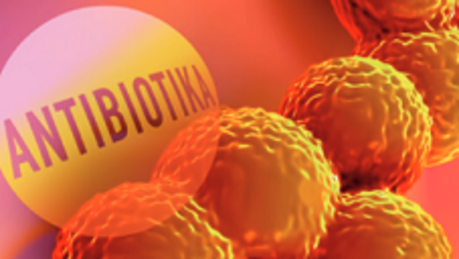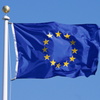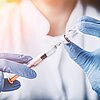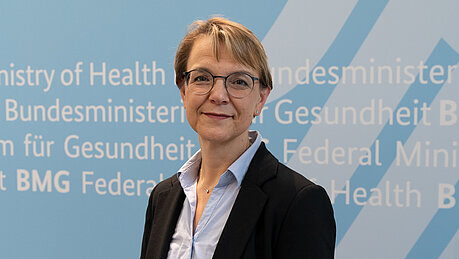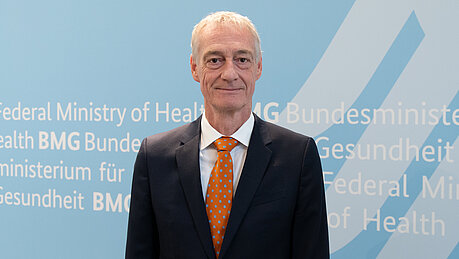"To ensure good care, we also need the patient perspective"
The genomDE initiative aims to give all patients access to the benefits of genomic medicine. The patient representatives Andrea Hahne from the Haus der Krebs-Selbsthilfe (House of Cancer Self-help) and Dr Christine Mundlos from the Allianz Chronischer Seltener Erkrankungen (National Alliance for Chronic Rare Diseases Germany) participate in this initiative. In this interview they explain why it is mandatory to involve patients and what they hope to achieve with the initiative.
© Copyright: BRCA-Netzwerk, Tamara Pribaten, Bielefeld und ACHSE e.V., Dirk Lässig, Berlin
Andrea Hahne vom BRCA-Netzwerk für das Haus der Krebs-Selbsthilfe - Bundesverband (links) und Dr. Christine Mundlos (rechts)
Ms Mundlos, what makes genomic medicine so important to those affected by rare diseases?
Dr Christine Mundlos: Current evidence suggests that an estimated 80 percent of rare diseases have a genetic cause. In most cases, however, establishing a diagnosis represents a big challenge. On average, it takes patients about seven years to be diagnosed; for some even much longer. Genomic diagnostics, which allows a comprehensive analysis of all changes in the genome, can accelerate this process. We anticipate that the broad application of this technology will improve this process resulting in more patients being diagnosed with higher precision and speed.
Ms Hahne, what is the situation in the field of cancers?
Andrea Hahne: Reliable diagnosis is also essential considering cancer. In addition to the genomic diagnosis itself, another important aspect is how to use the insights gained to benefit patients. Genomic medicine can already ascertain the risk of specific cancers. Targeted preventive measures can facilitate the early detection or potential prevention of cancer. When cancer does occur, it is equally vital to analyse the tumour’s genetic characteristics. This increases a personalised therapeutic approach to develop and apply treatments tailored especially to be effective against the patient’s specific type of tumour.
Why is it so important to involve patients in this process?
Mundlos: In addition to the diagnosis itself, we are eager to learn how affected individuals cope with their disease in everyday life. How can we support and encourage patients on every step of their way? Individual patients face a variety of different challenges in their everyday lives that go far beyond therapeutic perspectives that are generally covered by the medical staff. Sharing these experiences with others is one of the most important issues for patient organisations. Even though there are physicians who provide excellent care for patients with rare diseases, the patients’ perspective needs to be considered for a comprehensive approach.
Hahne: It is vital to include daily experiences of those affected and develop concepts together that are truly tailored to the target group and in line with reality. Cancer has a major impact on the lives of those affected and their families. This particular perspective is a meaningful complement to the expert knowledge of doctors and medical professionals as well as an integral aspect of research and treatment concepts.
This is why genetic tests are only performed with ones consent. How do you assess acceptance of such tests?
Mundlos: With the perspective of finally being diagnosed, patients are quite open to genetic diagnosis. At that point, data security and privacy are less of a priority. Their general attitude towards the use of data for research purposes tend to be rather positive, especially since there is not yet enough research in the field of rare diseases. Nevertheless, patients expect comprehensive information on the intent and purpose of the research, its compliance with data protection, information on the progress of the genomDE project, as well as transparency regarding its outcome.
Hahne: Patients’ openness is generally very high in the field of oncology, too. Being diagnosed with a genetic disease affects the whole family. Other family members might also be carriers of a risk mutation, fall ill in the future or pass their genetic disposition on to their children. Genetic analyses of the tumour tissue can also reveal genetic risk mutations. Therefore, it is important to in-depth information about the significance and potential of genetic diagnosis. Considering our responsibility towards future generations, data protection is essential in this situation. Good guidance is a must. It is a delicate situation that needs to go hand in hand with a great deal of empathy. This requires a high level of knowledge, skill and time.
What do you hope to achieve with the genomDE initiative?
Hahne: One crucial component is to securely combine existing data flows. There are currently many different registers and data collections. The genomDE initiative can serve as a central hub. The more information is pooled, the more reliable becomes evidence. However, to ensure better implementation, healthcare structures need to be expanded, too. Even in smaller towns, access to competent and specialised diagnostics and treatment should be assured and data made available for research purposes. This requires setting up the necessary structures.
Mundlos: In healthcare, valuable structures such as the National Action League for People with Rare Diseases (NAMSE) have been established over the past years. It is crucial to maintain and consolidate these structures. Then, we can establish and expand useful additions to them.
Where do you currently still see difficulties?
Hahne: Unfortunately, not all patients can currently benefit from the advantages of genomic medicine. One challenge, for instance, is the issue of funding. Some of those affected depend on decisions made on a case-by-case basis. These processes often take a lot of time – time that those affected do not have. I hope the genomDE initiative can make a difference in the interest of patients.
Mundlos: It will take major efforts to implement a comprehensive genomic testing into routine patient care. We are talking about a highly specialised, multi-disciplinary area of healthcare. This type of care can only be provided by interdisciplinary expert panels. Furthermore, structures have to be built that involve primary care providers according to their capacities. To achieve this, we have to significantly increase awareness about the services and tasks of centres for rare diseases in outlying regions.
What are your wishes for the future?
Hahne: My dream would be using genomic medicine to prevent cancer or make it a curable disease – which, I suppose, is somewhat unrealistic. For the time being, an interdisciplinary care network that is easy to reach for those affected would be desirable. Above all, the genomDE initiative could help to improve interdisciplinary cooperation in order to prevent loss of information. Therefore, patients affected by rare diseases or cancer would receive faster and better access to prevention and treatment.
Mundlos: Healthcare for our patients requires a structured comprehensive approach. For instance, defining the next steps for patients once they are diagnosed? They need to know who to contact and receive information about their next step in care. I hope genomDE will help us ensure that those affected can be diagnosed within one year – that would be a real milestone for the field of rare diseases.


